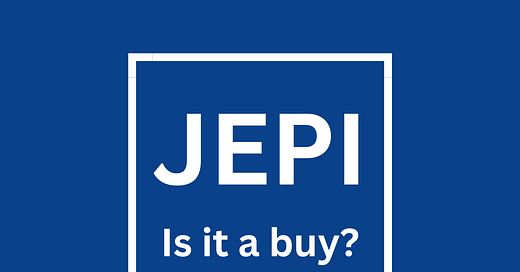Is JEPI a buy?
Welcome to the +110 subscribers who joined this past week and are now part of 10,188 millionaires, CEO’s and high-performing entrepreneurs who read the #1 financial newsletter on Substack.
If you want the benefits of being a premium subscriber, consider joining on a 14-day free trial.
It will allow you to test the waters before making any financial commitment.
Click below to unlock premium content.
Weekly Market Update 🗒️💡
Hey Silicon Valley Bank, you still up?
The Federal Deposit Insurance Corporation, otherwise known as the FDIC, took control and seized the assets of Silicon Valley Bank on Friday, in the middle of the business day...
The bank had $209 billion in assets and $175.4 billion in deposits at the time of failure.
This is big news. Because not only did this send shock waves throughout the market, but this is the LARGEST bank failure since Washington Mutual during the 2008 financial crisis.
Why did this happen?
As the Fed continues to raise interest rates in efforts to fight inflation, this causes investors to have less of an appetite for risk. The more expensive money becomes, the more risk-averse investors become.
Silicon Valley Bank was heavily exposed to tech and with people/companies becoming more risk-averse, they typically like to hold more cash on hand. This caused a large outflow of clients withdrawing their cash from the bank, which it couldn’t handle.
Ouch…
The effect on the rest of the market
When a bank fails, this sends ripples throughout the market.
We saw some tough performances this past week in the market.
The Dow dropped 4.44%, the S&P 500 lost 4.55% and the Nasdaq fell 4.71%.
My thoughts: as money continues to become more expensive, people and corporations will continue withdrawing from banks to meet their liquidity needs. Banks operate on deposits. Without them, they have no capital to make money. That’s why there is quite literally a war going on for deposits.
I don’t think we’ve seen the last of this. And I think those banks that are heavily exposed to one type of client, like Silicon Valley, or the smaller banks with fewer reserves on hand, will fail.
Is the bank sector dead? Definitely not. The government will continue to bail them out as they can’t afford for the bank sector to collapse.
But the fat is being trimmed.
Tweet of the Week

JEPI - The Cash Cow?
Income ETFs have recently become the popular thing for investors looking to boost their cash flow, but is this the best idea for your portfolio?
Of course the extra income is always nice, but at what expense?
In today’s newsletter, we’ll be exploring the popular income ETF otherwise known as JPMorgan’s Equity Premium Income ETF JEPI 0.00%↑
There are very few things that excite a dividend investor more than a quarterly dividend. One of those things is a monthly dividend that is astronomically high. JEPI offers exactly that.
Not only do investors get paid monthly but this ETF offers a whopping 11.91% yield (as at the time of writing). For context, that’s more than 7x the yield of the S&P 500 which sits around 1.65%.
Owning just 1 share, currently trading around $53, will earn you ~$6.35/share in dividend income every year.
So what’s the catch? Why are people so hung up on this high-yielding ETF?
Let’s find out.
What is JEPI
May 20, 2020, the day JEPI started trading on the stock market. Relatively new but quickly amassing $21.3B in assets under management (AUM).
Best described as a defensive ETF by using a covered call strategy, this actively managed (keep that in mind for later) was formed with the goal of…
“delivering a significant portion of the returns associated with the S&P 500 Index with less volatility, in addition to monthly income”
2022 was a great year for JEPI, finding its way into the top 10 equity ETFs with regards to inflows touching $6.8 billion. That’s a lot of investor money into one ETF. There’s gotta be something here, right?
The year before that, 2021, was a crazy year in the stock market. A monkey probably could have gotten a 25%+ return on their money. It was a time when investors felt invincible. Everything was going up. Everything people touched turned to gold. Tech stocks rallied, crypto was going to the moon, and nothing could go wrong. Until 2022 came around and said “hell nah!”.
Unfortunately, many investors decided 2021 was the perfect time to get into the market. Human psychology shows us that the fear of missing out, also known as FOMO, is very powerful, and beginner investors started to flood the market.
However what goes up must come down, and down it came.
As the market fell, many new investors realized it wasn’t all sunshine and rainbows in stock town. They could actually lose money… what a concept.
JEPI provided a “shoulder to cry on” for many investors. A popular way for them to stay in the equity market in a risk-controlled manner.




